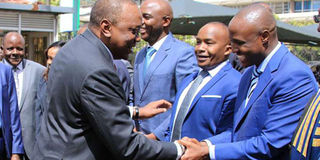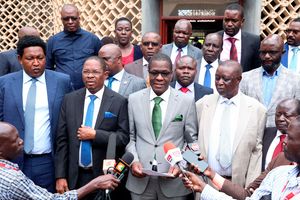Graft purge is a delicate balancing act for Uhuru

President Uhuru Kenyatta is welcomed by lawmakers when he arrived for the State of the Nation address at Parliament buildings in Nairobi on April 4, 2019. PHOTO | JEFF ANGOTE | NATION MEDIA GROUP
What you need to know:
- The composition of the Cabinet is, as a rule, an extremely tender balancing especially of what the President may see as the prevailing ethnic winds.
- Nevertheless, the leader’s sight ought to remain as clear as can be if he is to make personnel choices as accurate and as effective as is sociopolitically necessary.
One of the most difficult problems that face you as the head of state or head of government of any Third World country is that you almost always have to walk a tightrope.
That is why, no matter what any of his officials might have done, it cannot be emotionally easy for Uhuru Kenyatta, Kenya’s President, to send home any member of his Cabinet or any high official of his Civil Service.
Because the Cabinet’s composition usually requires an extraordinarily skilled balancing of certain very subjective and extremely delicate interests — especially the often messy ones of ethnic groups (tribes) — it may not be so easy for our President to touch any member of his present Cabinet even should it appear extremely necessary for the Head of State to sacrifice such a person.
As the DAILY NATION put it in its “splash” page-one headline on Friday, “Graft: Uhuru plays it safe on Cabinet purge”.
SELF-INTERESTS
As things appeared throughout the aftermath of that event, the composition of the Cabinet is, as a rule, an extremely tender balancing especially of what the President may see as the prevailing ethnic winds.
Of course, one of an African president’s chief problems is that his closest advisers are all likely to be motivated only by extremely dangerously subjective ethnic and personal interests.
Among the most troublesome of our President’s problems is that his eyes, being human, cannot always see totally accurately.
And reports from his spies are frequently likely to be dangerously coloured by extremely narrow and inaccurate ethnic prejudices and self-interests.
Nevertheless, the leader’s sight ought to remain as clear as can be if he is to make personnel choices as accurate and as effective as is sociopolitically necessary.
CAUTIOUS
That, as I see it, is the most probable reason that Uhuru Muigai Kenyatta, our President, now finds it necessary — as the DAILY NATION put it in its page-one “splash” headline on Friday — to “ … play it safe on Cabinet purge …” That’s right.
The head of government of any country of human beings is always advised to “ … play … it safe …”
He or she must handle every delicate situation with absolute SAVOIR FAIRE in order for him or her to prevent the situation from getting out of hand. For to get out of hand usually means inter-ethnic warfare.
Yet Kenya’s Uhuru Muigai Kenyatta has usually handled such problems with such admirable diplomatic skill that only the Old Man, Mzee Jomo Kenyatta, would have bequeathed to Uhuru (both genetically and by means of upbringing).
ELECTION
So far Uhuru has ruled Kenya with admirable SAVOIR FAIRE and wisdom.
However, our system includes the possibility that some individual may replace Uhuru Kenyatta by means of a proper presidential election.
But even if such a thing came to pass, the history books would still hand over to Uhuru Kenyatta the fact that — unlike what has happened in most other Third World countries — our young son did assume power by the method approved by mankind the whole world over.
In turn, moreover, he has bequeathed power to another person by methods that are universally approved.
That is the question: Why has Kenya been noted for humane, peaceful and systematic governance ever since its independence many decades ago?
DEMOCRACY
No, it is not — as the Western intelligentsia has alleged — because the Third World, especially Africa, is racially averse to democracy.
Even in Western Europe, North America and Japan, anybody with a properly educated mind knows that race has nothing to do with it.
Correctly, such things are to be identified with the socio-economic brutality that European colonialism perpetrated in Africa.
But — because the Third World’s ruling class was produced by Western European brutalisation of human beings — that is rare knowledge among the Third World’s elite.





